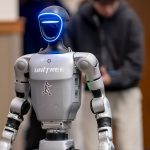Recently, there has been a lot of uncertainty as to whether the advancement in AI and Machine Learning would become a hindrance, even replacing jobs traditionally done by humans. Or, will it in fact, be an empowering addition to the workforce, allowing staff to use a more advanced skill-set by removing simpler administration tasks?
Do we trust AI to deliver in the workplace? Will it ever be as good as a human? Or can we use this technology to speed up decision-making in the office? Here, Olivier Novasque, CEO at Sidetrade, discusses the effets of AI and ML in the workplace, and the role of humans in a post-automation world.
What do we mean by AI in the workplace?
Artificial intelligence now fits in our daily lives and is being deployed in an increasing number of business sectors, hustling human expertise and transforming our jobs.
However, it does not necessarily represent a threat. In fact, these jobs should be redirected to less repetitive tasks, with greater added-value. Artificial Intelligence will make humans work in a smarter and more efficient way to achieve unparalleled competitive advantages.
Artificial Intelligence is a cutting-edge technology which is triggering deep disruptions in the entire value chain. While it’s opening the way to new skills, it also represents a major challenge that every business needs to face and overcome in the years and months to come. However, if handled correctly this is actually a huge opportunity. Managers and Top-Levels should lead their teams through this evolution by developing a serene and constructive climate so the targeted employees can learn to master the new set of skills that Artificial Intelligence requires.
Indeed, machines allow people to take on new responsibilities. For example, they can identify the most time-consuming and repetitive tasks that could easily be automated using bots, such as making copies of invoices.
It could also be the automation of claim identification with a real-time allocation to the relevant person within a company. For instance, at Sidetrade, we closely work with large companies on “co-innovation programs” to identify manual tasks and develop automated solution utilising AI technologies. This co-working spirit is necessary to prepare the change and move forward along this promising path.
How long have you been involved in AI?
Innovation has always been the essence of Sidetrade’s DNA, right from its outset in 2000. Across the last three years, we‘ve made significant progress in R&D: we’ve set up our own Data Science Lab, we‘ve invested in three cutting-edge Artificial Intelligence start-ups and we’ve launched Sidetrade Payment Intelligence Solution to improve customer relationship and speed up cash generation.
The “A.I Race” to be at the forefront of technology has led us to build a new set of tools to handle the entire customer journey. It starts from detecting the best leads, which are the most likely-to-convert into sales opportunities utilising machine learning algorithms, to the identification of relevant cash opportunities for the finance support teams using our SPi Solution. Our end-goal along this journey is to reshape Customer Engagement to create business value, quickly, easily and effectively.
There has been a lot of uncertainty as to whether the advancement in AI and Machine Learning would become a hindrance. What is your opinion on this?
Disruptive technologies invariably provoke as much trepidation as they do fascination. But Artificial Intelligence is not the stuff of science fiction. It’s here. Predictive analytics programmes are already running and machine learning is a reality for leading companies seeking to create value. All of this has already been tested and approved by the big American four: GAFA (Google, Apple, Facebook and Amazon), and the big Chinese four: BATX (Baidu, Alibaba, Tencent and Xiaomi), in the B2C area. The ability to establish functional fast software drivers within companies is here too. This is an opportunity companies can’t miss!
Rather than a hindrance, Artificial Intelligence and Machine Learning are empowering businesses to become more agile, more flexible and more efficient than their main competitors.
How can we use this technology to speed up decision making in the office?
Robots and Artificial Intelligence could boost your productivity by 30% to 50% in some departments of your company. For the most innovative companies this is an opportunity to stay competitive by exploiting their data to grow sales and accelerate cash.
The first step is to formalise their “data strategies” and break the silos to aggregate the customers’ data coming from marketing automation, CRM, ERP, CMS and social media. Then, the next step is to make sure they are reachable and exploitable so they can offer the right content to the right audience, at the right moment. Therefore decision making will no longer be based on intuition, but on data resources correctly processed to deliver immediately actionable insights. The result is a dramatic improvement in operational efficiency and productivity.
Every C-level is looking for ready-to-start projects in this fast-moving environment. Rather than a project that would take years to implement and an important budget, they are looking for solutions that can provide results in just a few weeks so they can test and learn efficiently the benefits of Artificial Intelligence for their organisations.
How can we financially benefit from AI?
The quest for performance is often the first reason companies deploy Predictive Analytics solutions, followed by the creation of new revenue source and the improvement of profitability. These growth acceleration factors that were once out of the range are now attainable. Data can be decrypted in real time to provide a predictive payment score for each customer. Companies can now count on the power of predictive models and machine learning to visualise in one click customer payment behaviours and prioritise efforts to improve performance.
Artificial Intelligence provides CEOs and CFOs with valuable insights. These insights could help identify which customers are paying their suppliers better than they’re paying your company. It could also help your company roll-out machine learning algorithms to eliminate various mundane tasks for the customer supports teams. This way, they can improve the entire customer Journey, increase their reactivity and save cost at the same time.
Will AI ever do as good a job as a human? What is the role of humans in a post-automation world?
Artificial Intelligence is now part and parcel of our economy and it’s likely to radically alter the workplace as we know it.
In some vertical and very specialised tasks, Artificial intelligence already performs better than our human brains: it can detect related symptoms in a faster and better way or beat worldwide champions in strategic games. Nevertheless, when it comes down a transversal task requiring a global overview on different specific points, fortunately, humans’ brains are better performing. Let’s not forget that Artificial Intelligence technologies are not self-aware yet. These technologies cannot grasp reality in all its complexity. For the moment, they can just help businesses identify patterns to address specific points. The key is to bring Artificial Intelligence technologies and humans together, which means in the end augmenting human brains with technology.
Artificial Intelligence will automate lot of specific tasks, meaning the related jobs could be threatened. Employees who are already working on a daily basis with Artificial Intelligence have the opportunity to master this technology from the beginning and then follow its evolution stage by stage. This opportunity will soon become a true competitive advantage when companies will need Artificial Intelligence specialists who can work hand-in-hand with these new robots workers.
We are entering the anticipation era, where automation is mandatory to ensure growth: repetitive and less qualified tasks will be taken over by robots and free us so we can focus on more added-value tasks. Artificial Intelligence will amplify human brains and allow us to focus on more added-value topics. If we properly manage this disruption, Artificial Intelligence will unlock our potential by becoming a tool complementary to the human brain. This is the main challenge humanity has to face.










